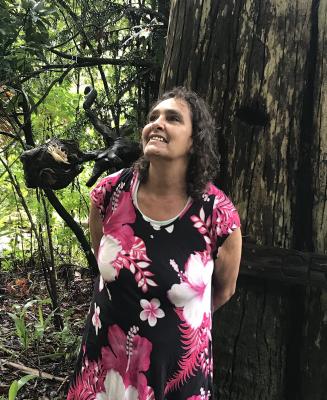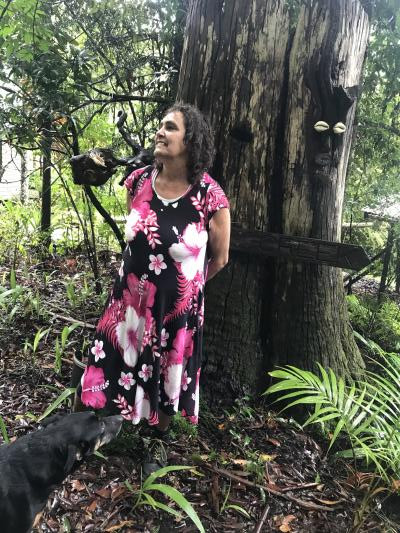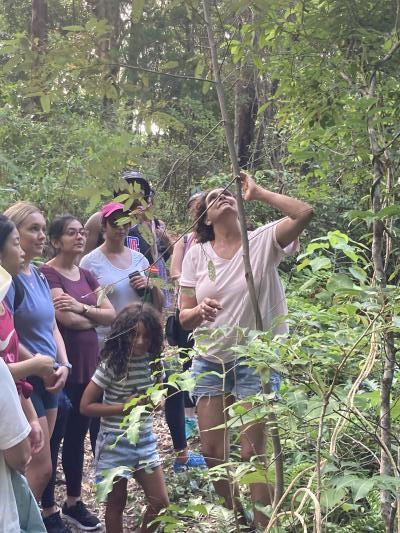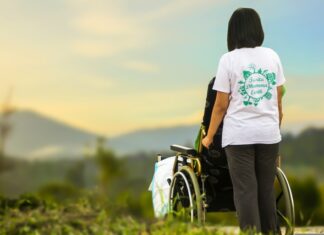“I was actually born in an aeroplane,” says Kabi Kabi Elder Aunty Beverly Hand, waving her arms through the air like a plane as we sit by a pot belly stove on a damp, misty morning in the forest near Mapleton.
“Mum was being taken from Goroka to Mount Hagen to have me, but I couldn’t wait,” she continues. “At least that’s the story she always told me, but I never got any details beyond that. She also used to say that I was born with a veil over my face. Sailors believe that this is a good omen, and if a member of the crew was born with a veil, you’ll be safe from shipwreck. Mum said if ever I was on a ship, I should tell the captain and I’d be put at the top table!”
Aunty Bev’s laughter rocks the annexe of her simple shelter on a beautiful property within the Mapleton Forest. Like her Kabi Kabi mother, Bev Hand likes to leave her stories dangling, perhaps to entice listeners to use their own imaginations. The effect is quite mesmerising. The stories, whether you believe them or not, blend into a sense of beginning to understand an ancient culture, knowing that it’s a small step down a very long road.
Sitting with Bev while the rain tumbled down in the forest, I was reminded of a time long ago when our children were small and the great actor David Gulpilil, who was working in the neighbourhood, came to our house and put all of us under the spell of his Dreamtime stories. Aunty Bev weaves a similar web.
Her father, Australian born of English and Welsh parents, met her mother, Penny Bond, at the Kangaroo Point Methodist Training College, where he was studying for the ministry and she was working in the kitchen and learning public speaking part time. But for her father, the law proved a stronger calling, and in 1962 he accepted a position as a chief magistrate in the highlands of Papua New Guinea. Unable to marry in Australia, the couple tied the knot in Port Moresby before heading to the back country. Four children followed, Bev’s airborne birth being the last.
Bev and her siblings spent their formative years on Huli country in the Highlands where, under the protectorate, “The magistrate and his family were like royalty,” she recalls. But when independence came in 1975, the family was sent home to Brisbane, where Bev encountered racism for the first time at Milton State School.
Her father left the public service for a time to renovate and sell houses, but when he rejoined to become an Aboriginal Affairs manager, the family was on the road again, from Bundaberg to Townsville and finally Roma. Bev says there were racist episodes at every school she attended, but with the quiet counsel of her mother, she rose above it.
“I actually loved moving from school to school because I could rebirth myself. Mum always said, write your own story but continually edit it. Going to new schools always made me step up to the plate, because you have to. I finished year 10 with a high distinction. I was in the debating club, the photography club, the student council, the school plays. On my first day of year 11 at Roma I got called to the headmaster’s office and he said he didn’t think I should continue at school because I’d be a bad influence. He said if I put one foot out of line I’d be gone. I told mum and dad and they just said, don’t worry, keep going. I was going to be a lawyer. I had one teacher who stood in my corner, but I didn’t last long. You can only take so much.
“So I left, had a child and started waitressing. A friend got me into a place at Toowoomba called The Haven, which was a kind of youth refuge run by Baha’is, and they got me into stuff like Bach flower remedies. I volunteered at the neighbourhood centres, working in the garden mainly. At 17 I became a charter member of Roma Rotaract Club. I was community services director and sergeant at arms. I loved the whole Rotary thing. You learn how to handle situations and protocols. Both my parents were political so I had that grounding already, but this reinforced it.”
Aunty Bev says her mum had “drummed the Kabi Kabi culture into us from the moment we could listen, and she’d sing us the songs.” Without prompting, Bev breaks into song. The rain is beating down on the other side of the thin wall of the annexe, but her rich, strong voice cuts through the sounds of the forest.
She says: “That was a lullaby created by my great-grandfather Fred Embrey, who was a songman. (Radio and TV funnyman) Jamie Dunn bought Fred’s king plate at a second-hand shop on the coast and he went looking for Fred’s family to give it back, so it ended up at Cherbourg State School. They filmed that for Aggro’s Cartoon Connection.”
Bev crosses the room and takes an ancient photo from the wall. “It says: “Fred Embrey, King of Mount Mia Station, Kilkivan, February 21, 1927.” The breast plates were a contentious part of the institutionalisation of Aboriginal people in the late 19th and early 20th centuries, promoting a hierarchy that didn’t exist, but there is a certain pride in being able to track your lineage, by whatever means, and Bev Hand’s lineage is a proud one indeed.
She continues: “My favourite song of my great-grandfather’s is called Jalan Jingu, and it’s about when the djan ‘djaris come.” She bursts into energetic song again. “Fred Embrey was under a bunya tree collecting bunya nuts and putting them in his bag, and he started to get hit in the head by nuts. He looked around and couldn’t see anybody, then he looked up the tree and there was a djan ‘djari up there and it said to him, hey, only take what you need. So he emptied most of the nuts out of his bag and left, and later he wrote that song to remind people of that. Only take what you need.”
I confess I’m not sure what a djan ‘djari is. She explains: “The djan ‘djari is the hero of plenty. It’s real enough for us. He can also become a spark of light and teach you how to use fire. He’s also the keeper of the law. We didn’t have a written book of laws, so the best way to keep in touch with law is through those stories, and through being in touch with those cultural, ancestral beings. A lot of our stories talk about how to deal with the law without taking it into your own hands.”
She works a cleaning job to keep the wolf from the door, but the lesson in Kabi Kabi culture I received in her annexe the other morning was more in line with where Aunty Beverly Hand’s heart resides today. A committed environmentalist who likes to use the stories of country to illustrate the culture, she has worked with other researchers, historians and anthropologists on the cultural heritage aspects of numerous Environmental Impact Statements. “But I had to give it up,” she says. “It was too heartbreaking.”
These days she prefers to work with agencies like the Noosa Environmental Education Hub,
delivering “Indigenous perspectives to schools, bringing culture in via the environment”. And Aunty Bev’s guided walks on country have become hot tickets whenever they are announced.
Moreover, for the past 14 years she has been committed to revitalising one of the most important and historic cultural gatherings on the Aboriginal calendar, one that fell away during the decades of institutionalisation. She says: “Bunya Dreaming is not about teaching other people about our culture or about teaching our people about themselves. It focuses on the tree. It’s a way for me to get people together so that we can break down barriers. It’s been bloody hard, trying to revive a traditional event in a contemporary way. I’ve got to get corporate about it somehow or it won’t survive. People come along and want to make it bigger, but bigger isn’t better.”
But Bunya Dreaming needs funding nonetheless, and Aunty Bev is planning a fundraising Bunya Banquet for October. Watch this space.
I come away from my morning with Aunty Beverly Hand feeling enriched and enlightened. She’s given me about 100 tips for my future research, but as an educator she has a light touch, and I feel I have merely been entertained. But I feel I have also learned something about this strong Kabi Kabi woman who has survivor written on every line of her striking face.











